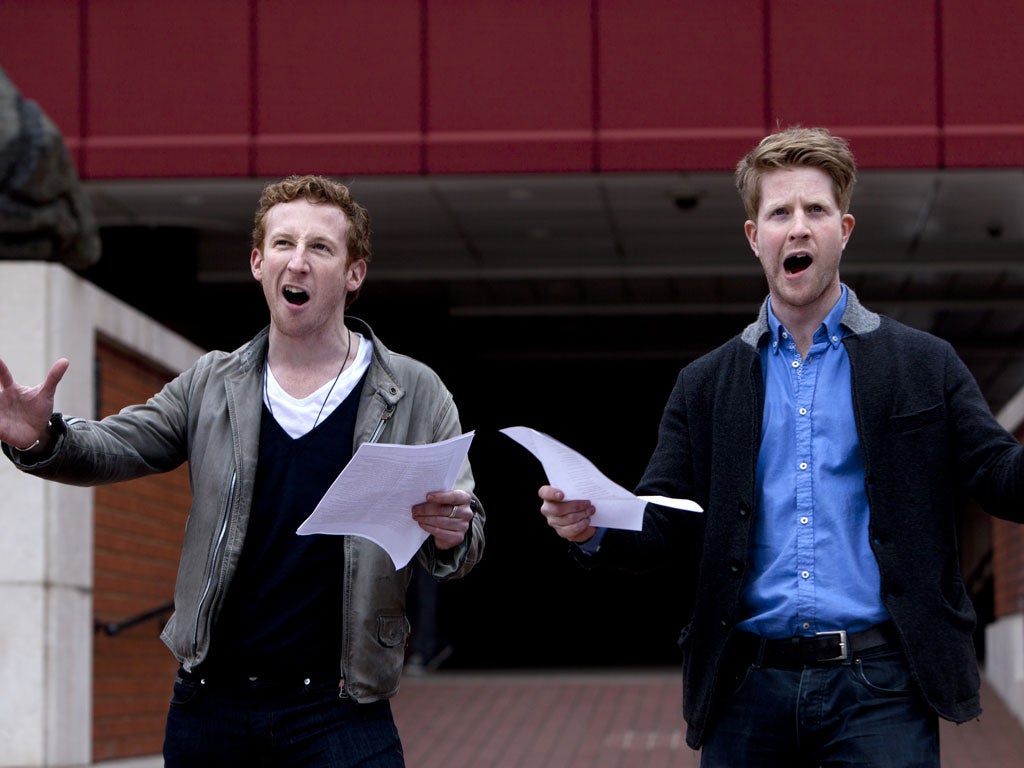'Tuh beh oar nat tuh beh?' That was the question
This radically different pronunciation is, according to a new scholarly recording of Shakespeare's works, much closer to the way the line would have been spoken

Your support helps us to tell the story
From reproductive rights to climate change to Big Tech, The Independent is on the ground when the story is developing. Whether it's investigating the financials of Elon Musk's pro-Trump PAC or producing our latest documentary, 'The A Word', which shines a light on the American women fighting for reproductive rights, we know how important it is to parse out the facts from the messaging.
At such a critical moment in US history, we need reporters on the ground. Your donation allows us to keep sending journalists to speak to both sides of the story.
The Independent is trusted by Americans across the entire political spectrum. And unlike many other quality news outlets, we choose not to lock Americans out of our reporting and analysis with paywalls. We believe quality journalism should be available to everyone, paid for by those who can afford it.
Your support makes all the difference."To be, or not to be, that is the question." Or is it "Tuh beh oar nat tuh beh"? If you were to ask the Bard himself, he'd probably say the latter.
This radically different pronunciation is, according to a new scholarly recording of Shakespeare's works, much closer to the way the line would have been spoken by the company of actors who first performed Hamlet 400 years ago.
Far from the haughty clipped vowels we are used to hearing from a thousand actors since Laurence Olivier, the "real" Shakespeare sounds more like a West Country farmer, with a dash of Irish and even a hint of east coast American.
"People from all over the country were coming to Elizabethan London and their accents were fusing," said Ben Crystal, an actor, director and expert in OP (original pronunciation) Shakespeare. "Not long after Shakespeare's time people started getting on the boats to America, and later Australia. Some sounds in modern accents from these places, are the same sounds that would have been heard on the tongues of Shakespeare's contemporaries."
Attempts to get back to the original sounds of Shakespeare have been made before, most notably at The Globe in London, and in a performance of Hamlet in Reno, Nevada in which Crystal played the lead role, with an accent reminiscent of a Devon farm labourer. Now, working with his father, the linguistics expert David Crystal, he has produced an extensive recording of some of Shakespeare's best known speeches and sonnets for the British Library, all in the original pronunciation.
The result is a more muscular Shakespeare that sounds harder and much closer to the common man than we have become accustomed to. "Romeo, Romeo," becomes "Rohm-yo, Rohm-yo"; two short syllables that sound like Sam Gamgee from The Lord of the Rings saying "Frodo, Frodo". Henry V's "Once more unto the breach" becomes "Ons moar un-tuh thuh braych", which, when roared out to an imaginary army, makes King Henry sound more like a bar-room brawler than the prim aristocrat that Olivier portrayed in the 1944 film.
The original pronunciation also makes the language move faster. Crystal's OP version of Hamlet, though abbreviated no more than most productions, was about half an hour shorter than most. "When we hear original pronunciation used in relation to Shakespeare, we enter a new auditory world," said David Crystal. "Rhymes that don't work in modern English suddenly work. Puns missed in modern English become clear."
The Crystals are "95 per cent sure" of the accuracy of their method. Taking as their sources the archaic spellings used in Shakespeare's First Folio and an early grammar textbook written by his contemporary Ben Jonson, they were able to trace the sounds of Shakespeare in the rhythms and rhymes of his plays and poems.
Rhymes that do not work in modern English, such as "love" and "prove" suggest an older pronunciation. As Ben Crystal puts it, "no-one other than Elvis Presley ever extended the vowel sound in love", the rhyme must be on "prove" – so "love" for Shakespeare sounded like "loove".
New and old: The Bard's English
As You Like It
"All the world's a stage,
And all the men and women merely players"
"Al thuh warrld'z uh stehdge, Und al thuh men und who-men meerlee play-uhrz"
King Lear
"Blow, winds, and crack your cheeks! Rage! Blow! You cataracts and hurricanoes"
"Blow, weinds und crack yoar cheks! Rehge! Blow! Yew kat-arr-aks und hurr-ee-kan-ohs"
Richard III"A horse, a horse! My kingdom for a horse!"
"Uh hoarse, uh hoarse! Muh kin'dum furrah hoarrse!"
* Shakespeare’s original pronunciation is published by the British Library, price £10.00. www.bl.uk/shop
Join our commenting forum
Join thought-provoking conversations, follow other Independent readers and see their replies
Comments